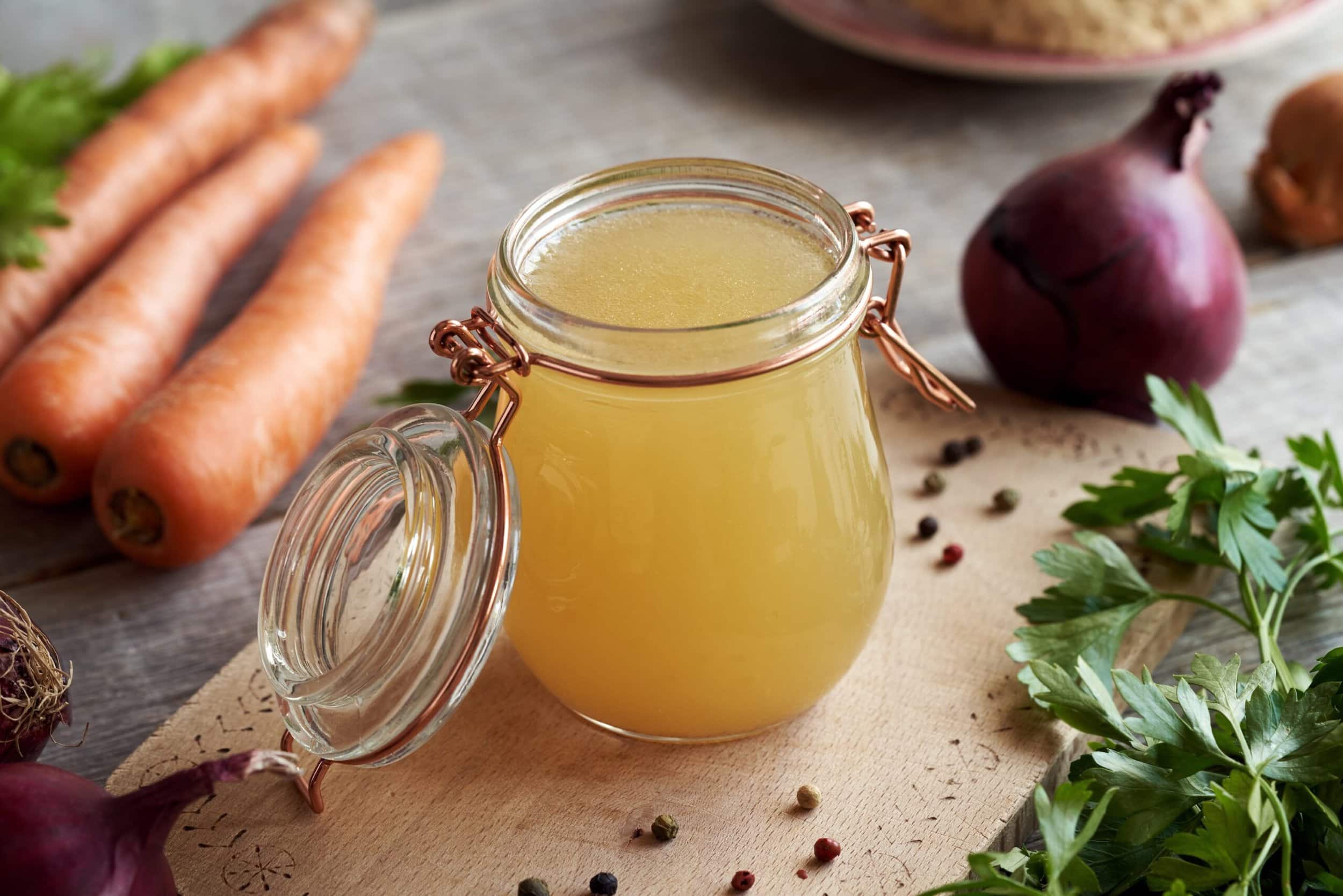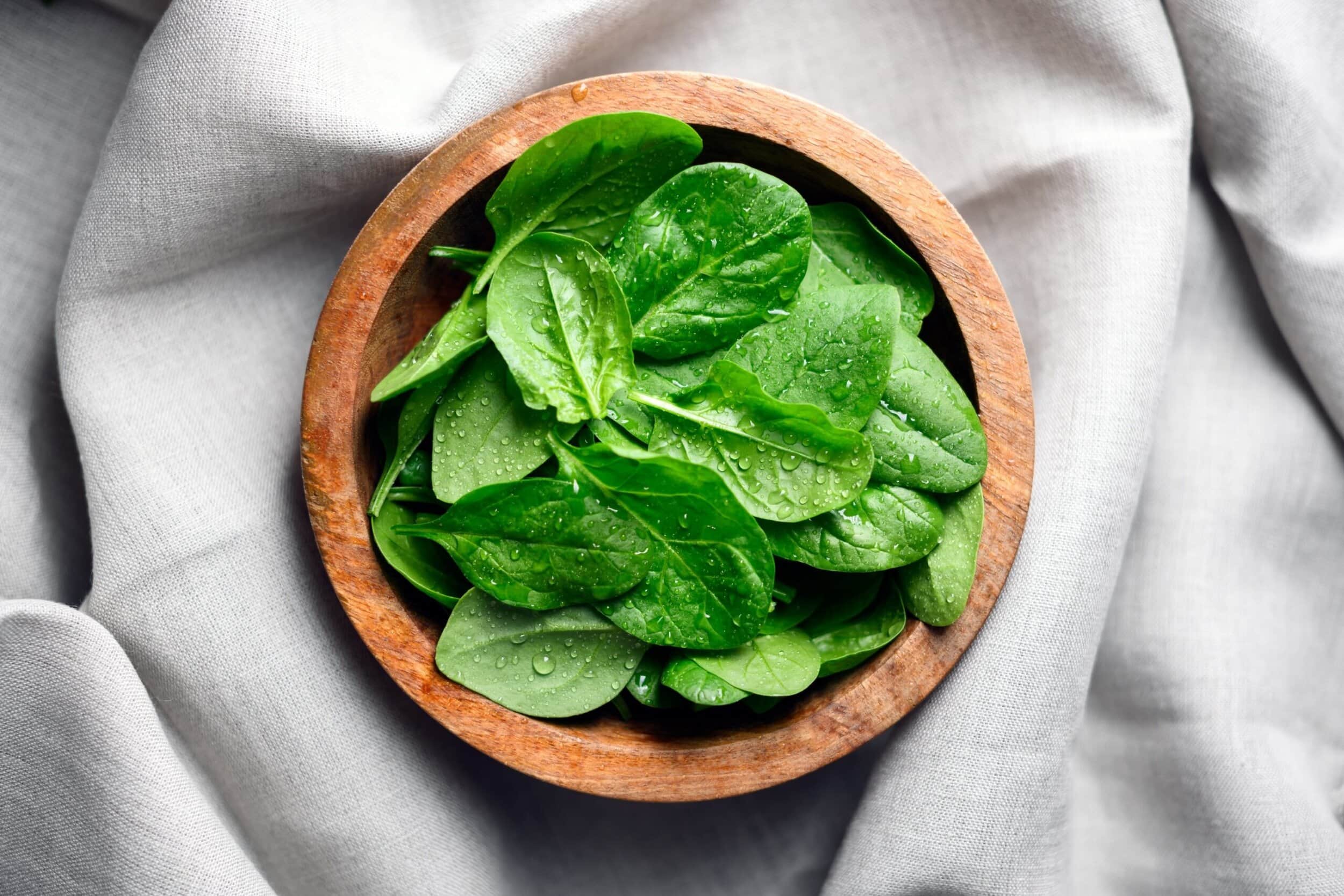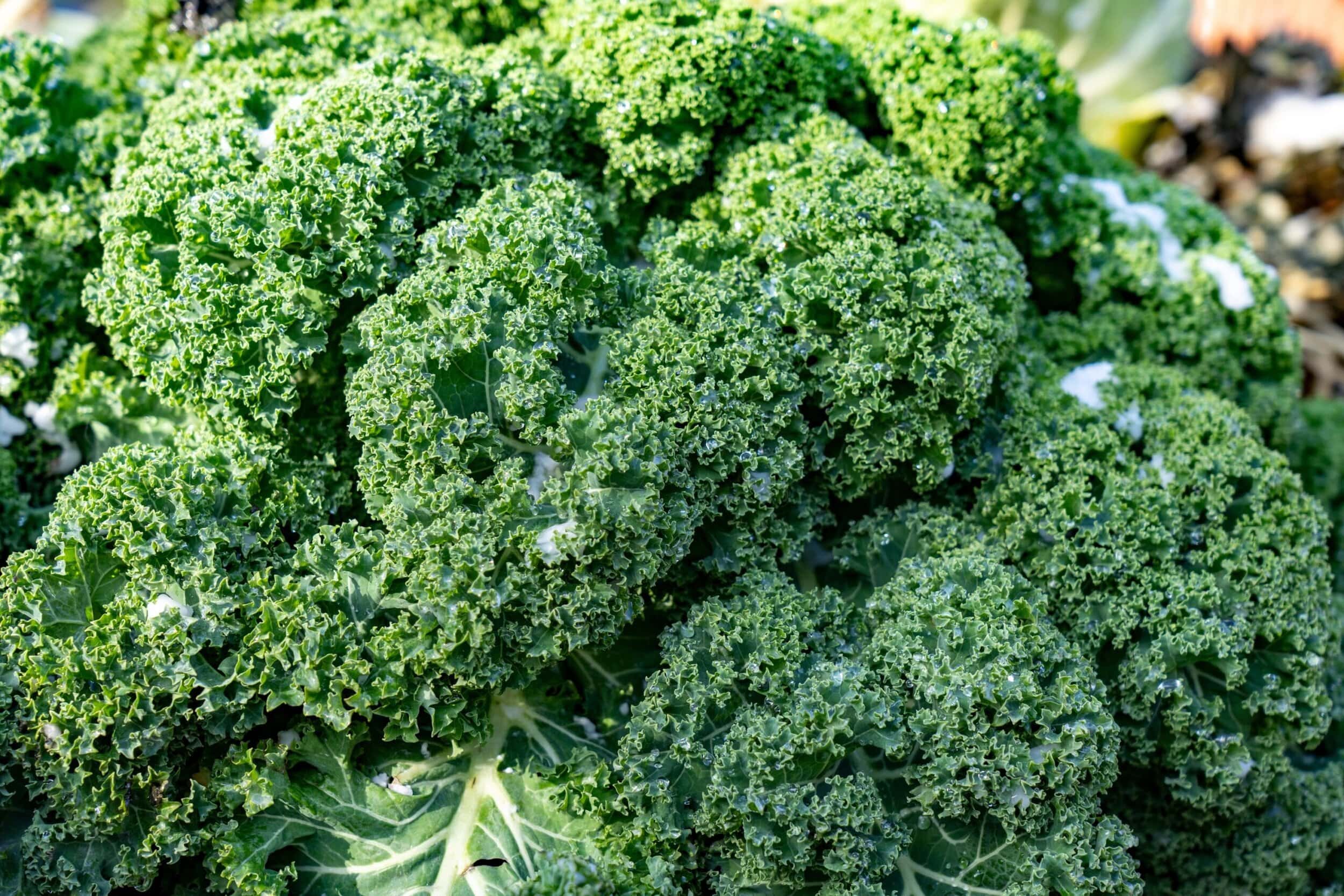What you’ll learn:
- Homemade turkey bone broth is easy to make, cost-effective, and helps reduce food waste.
- Turkey bone broth is a satisfying, low-calorie, nutrient-dense addition to a healthy eating plan.
- Turkey bone broth is rich in collagen and minerals that support gut, joint, and skin health.
Bone broth has become a wellness staple, celebrated for its protein, natural collagen, minerals, and gut-supporting properties. While beef and chicken versions tend to get the spotlight, turkey bone broth offers a flavorful—and timely—alternative. It’s also the perfect way to make use of your leftover Thanksgiving turkey.
Though you can make it any time of year, the post-holiday season provides the ideal opportunity to turn turkey bones into something nourishing instead of letting them go to waste.
If you’re looking for a nutrient-rich, comforting broth that may support hydration, weight loss, and overall health, turkey bone broth is worth trying.
We’ll break down what makes turkey bone broth healthy, how it compares nutritionally to other broths, and why it’s worth making at home versus purchasing at the store. We also asked Kayla Reynolds, MS, NASM-CPT, Noom’s Director of Knowledge, Learning & Behavior, to share her insights on turkey bone broth and its benefits.
What is bone broth?
Bone broth is created by simmering animal bones and tissues (sometimes with vegetables and herbs) for a long period, often 12 to 24 hours. This slow process allows the bones to release beneficial compounds, like protein and minerals, into the broth.
What’s the difference between bone broth and stock/regular broth?
The long, slow-simmering process is what separates bone broth from standard stock. This extended cooking time is necessary to break down the animal bones and connective tissue collagen into gelatin, and then release other nutrients. These are the components credited with many bone broth health benefits.
- Collagen and gelatin: Collagen within bones converts to gelatin when cooked, giving the broth a thick, jiggly texture when cooled. Gelatin is high in protein and plays an essential role in joint health because it provides amino acids like glycine, which support cartilage repair and flexibility. It also promotes satiety due to the gel-like consistency in the stomach, helping you feel fuller for longer.
- Minerals: Some minerals from the bones do make their way into the broth, particularly potassium and small amounts of calcium and magnesium, but generally not in high enough amounts to cover much of your daily needs. A 1-cup serving of turkey bone broth typically provides around 2 to 3% of your daily calcium and about 2% of your daily potassium. So consider the minerals a nice bonus, while the real stars are the protein and gelatin, which help support satiety, joint comfort, and healthy digestion.
“Turkey bone broth is low-calorie and nutrient-dense, making it a great choice if you’re on a weight loss journey or looking to improve your overall health says Reynolds.
Is bone broth good for weight loss?
Bone broth can be a helpful addition to a weight loss routine because it’s high in protein and very low in calories, which can help you feel fuller for longer without adding much to your daily intake. The gelatin and amino acids in bone broth also contribute to satiety, making it a comforting option between meals or in place of higher-calorie snacks. While it won’t cause weight loss on its own, incorporating bone broth into balanced meals or sipping it between meals can support appetite control and mindful eating.
What’s the best time to drink bone broth for weight loss?
There’s no single “best” time; it’s more about how you use it. Bone broth can be especially helpful between meals, because the protein and gelatin can help you feel fuller without adding many calories. Some people also like drinking it before a meal to take the edge off hunger, which may help with portion control. And if you tend to snack at night, sipping warm broth in the evening can be a soothing swap for higher-calorie snacks.
A warm beverage or soup might also feel more satisfying than a cold drink (and some research backs this). Enjoying a mug of turkey bone broth may help you feel fuller between meals and manage appetite, which can be a helpful piece in a weight-loss strategy.
Turkey bone broth: Nutrition highlights
While the exact nutrient profile of turkey bone broth depends heavily on the bones used (joints, marrow, and the amount of meat left on the bones) and simmering time, in general, it’s low in calories, high in protein, and also includes some key minerals.
If you’re looking for something warm, satisfying, and good for your health, turkey bone broth checks all the boxes. Unlike traditional broths, it delivers a surprising amount of protein with little to no fats or carbs, making it a smart choice for anyone focused on satiety and muscle support, while keeping calories in check.
Here’s what’s inside:
Turkey bone broth nutrition facts (1 cup / 240 g serving)
| Nutrient | Amount | %RDA* |
|---|---|---|
| Calories | 45 | — |
| Total Fat | 0 g | 0% |
| Saturated Fat | 0 g | 0% |
| Cholesterol | 0 mg | 0% |
| Sodium* | 300 mg | 13% (limit-based) |
| Total Carbohydrates | 1 g | 0% |
| Dietary Fiber | 0 g | 0% |
| Sugars | 0 g | — |
| Protein | 10 g | 20% |
| Calcium | 30 mg | 3% |
| Potassium | 148 mg | 3% |
*Recommended dietary allowance (RDA) is defined as the average daily amount of nutrients needed to meet the requirements of nearly all healthy people in a specific group.
Why turkey bone broth stands out
- High in protein, low in calories: With 10 grams of protein and only 45 calories per cup, it’s an easy way to stay full without overdoing it on calories. Protein helps you feel fuller for longer, supports muscle maintenance, and aids in tissue repair.
- Little to no fat or carbs: Ideal for low-carb, low-fat, or calorie-conscious eating plans.
- Hydrating: Provides small amounts of electrolytes like potassium and calcium to support hydration and bone health.
- Comforting and versatile: Sip it solo, use it as a soup base, or add it to grains or sauces for a nutrient boost.
Other benefits
Gelatin: Promotes joint flexibility, healthy skin, hair, and nails, while also helping to support the gut lining. These structural proteins can enhance tissue repair and may reduce discomfort associated with joint stiffness or aging.
Glycine: This amino acid can encourage restful sleep, support liver detoxification, and play a critical role in collagen synthesis and gut repair. It also helps calm the nervous system and reduce inflammation throughout the body.
Turkey bone broth vs. chicken and beef bone broth
When comparing turkey bone broth, chicken bone broth, and beef broth, they’re quite similar nutritionally, despite small differences in fat content and amino acid profile. The main difference is in flavor.
- Chicken bone broth: Chicken broth is lighter in color and flavor, making it popular for everyday use. It’s usually lower in fat than beef broth.
- Beef bone broth: Beef broth has a richer, deeper flavor because beef bones and marrow are denser than turkey. It’s often higher in fat and iron than chicken or turkey broth.
- Turkey bone broth: Turkey broth falls in the middle in terms of flavor. It’s more flavorful than chicken bone broth but lighter than beef.
All three broths have similar nutrition and small differences in amino acids. Also, researchers found that bone broths aren’t better sources of protein or amino acids than other animal foods. Still, they’re a warm, comforting way to add flavor and nutrition to your meals.
Side by side, their nutrition information is very similar:
| Nutrient | Turkey bone broth | Beef bone broth | Chicken bone broth |
|---|---|---|---|
| Calories | 45 | 40 | 41 |
| Protein (g) | 10 | 10 | 9 |
| Total fat (g) | 0 | 1 | 0 |
| Sodium (mg) | 300 | 330 | 486 |
| Potassium (mg) | 148 | 110 | 24 |
*Nutrition statistics from Noom.
What’s the best bone broth for weight loss?
The best bone broth for weight loss is the one that’s high in protein and low in calories, and turkey bone broth fits that balance especially well. With about 10 grams of protein per cup and virtually no fat or carbs, it can help you stay full and satisfied without adding many calories.
Chicken and beef bone broths offer similar nutritional benefits, and these can change based on how long you cook them and any added ingredients. The biggest difference comes down to taste and how you’ll use it. If you enjoy the flavor and find yourself reaching for it often, that’s the broth that will support your goals most consistently.
Homemade versions also allow you to control the sodium level and avoid added ingredients, which can be helpful when monitoring appetite or weight.
What are the health benefits of turkey bone broth?
The magic of bone broth really comes down to what happens during that slow, steady simmer. As the turkey bones and connective tissue cook, they release beneficial compounds, like collagen, gelatin, and amino acids, that give bone broth its reputation as a nourishing powerhouse.
And those nutrients don’t just sound good on paper—they actually do a lot for your body. From supporting gut health to promoting healthy skin and joints (and even helping you stay hydrated), turkey bone broth has plenty to offer. Let’s take a closer look at some of those key benefits.
Gut health and digestion
Turkey bone broth might be a smart pick for gut health thanks to its gelatin. Gelatin is naturally rich in glycine, an amino acid that plays a role in supporting the intestinal lining and healthy digestion. Research suggests glycine can help protect gut barrier function and reduce inflammation in the digestive tract. And since warm broth is easy on the stomach, many people find it a soothing choice when their digestion needs a little extra care.
Skin and joint support
Bone broth provides the building blocks your body needs to maintain strong connective tissues, from skin to joints. Specifically, it may support:
- Collagen repair: The amino acids in turkey bone broth can help your body rebuild collagen, which supports the strength and elasticity of your skin, tendons, and ligaments. Collagen intake can help support joint comfort and skin firmness.
- Amino acid support: Regularly sipping bone broth may also supply essential amino acids that promote joint resilience as you age. Research suggests these amino acids can help preserve muscle and joint function over time.
Hydration and recovery
Turkey bone broth is making it more than just a low-calorie drink with only 30-50 grams per cup. It’s hydrating. It also contains some electrolytes, like sodium and potassium, which further aid in hydration and recovery, especially when pursuing rigorous exercise goals.
Why it’s worth making homemade turkey bone broth
Most store-bought bone broth is quite expensive. Homemade bone broth can offer a cheaper alternative that’s also a good way to use leftover turkey bones from Thanksgiving and reduce food waste.
- It’s nutrient-dense: Homemade broth, whether made in a turkey bone broth crockpot or Instapot, can be richer in nutrients than store-bought varieties.
- It’s cost-effective: Using leftover turkey carcasses from a holiday meal is incredibly cost-effective and is a great way to reduce food waste.
- You have the control: Making a homemade turkey bone broth recipe gives you absolute control over ingredients. You can control the amount of added sodium and avoid the artificial flavorings often found in commercial products.
“When you make your own bone broth, you’re not just creating a comforting drink—you’re extracting real nutrition from ingredients that might otherwise go to waste,” Reynolds adds.
How to make a nourishing turkey bone broth: An easy recipe
Homemade turkey bone broth is the perfect way to turn scraps into a delicious and nutritious drink. With just a few ingredients and a little time, you can create a rich, comforting broth packed with flavor and nutrients.
Ingredients:
- Turkey bones or carcass (from a roasted bird or raw parts)
- 10–12 cups of water
- 1 onion, quartered (optional)
- 2 carrots, cut into chunks (optional)
- 2 celery stalks, cut into chunks (optional)
- 2–3 garlic cloves (optional)
- 1–2 tablespoons apple cider vinegar (helps extract minerals from bones)
- Salt and pepper to taste
Instructions:
- Place the turkey bones in a large pot or slow cooker. Add any optional vegetables for flavor.
- Pour in the water and vinegar, making sure the bones are fully covered.
- Bring to a boil, then reduce to a low simmer. Skim off any foam that rises to the top.
- Simmer gently for 12–24 hours (or at least 6 hours if you’re short on time). Add more water if needed to keep bones submerged.
- Strain the broth through a fine mesh sieve, discarding the solids.
- Let cool, then refrigerate. Skim off the solidified fat from the top before using if desired.
Storage tip:
Store in the fridge for up to 5 days or freeze in portions for up to 3 months.
How to use turkey bone broth
Think of turkey bone broth as your kitchen multitasker; it fits right into almost any eating style, from keto to low-calorie plans. Here are a few easy ways to make it part of your day:
- Sip it warm: It’s a satisfying way to manage cravings between meals or unwind at night without adding extra calories.
- Make it your soup base: Swap your usual stock for turkey bone broth to give soups, stews, and sauces a nutrient-rich boost (and deeper flavor).
- Cook with it: Use it instead of water when making grains like quinoa or rice—you’ll add subtle flavor and a touch of extra protein.
- Add it to your wellness routine: A cup of broth after a workout or when you’re feeling low-energy can help you rehydrate and refuel gently.
Remember, no single food is magic; it’s about consistency and variety. For comprehensive support in building lasting habits, explore Noom’s psychology-based program.
The bottom line: Make turkey bone broth for a simple, low-calorie sip
Turkey bone broth may not get as much attention as chicken or beef, but it earns its place in your routine—especially if you’re focused on weight loss or managing hunger. It’s naturally high in protein and gelatin, which can help you feel satisfied between meals, support digestion, and keep overall calories in check.
Making it at home is also surprisingly easy and budget-friendly. Just simmer your leftover turkey bones with water and seasonings, then freeze in small portions so you can sip it anytime. It also reduces food waste and gives you full control over ingredients like salt.
At Noom, we believe it’s not just about one “superfood,” but about building balanced, sustainable habits. Looking for more guidance and tips for making the holidays healthy? Download the Noom app today on iOS & Android. You’ll get personalized guidance, daily tips, and easy meal ideas to help you reach your goals and feel your best.
Why you can trust us
At Noom, we’re committed to providing health information that’s grounded in reliable science and expert review. Our content is created with the support of qualified professionals and based on well-established research from trusted medical and scientific organizations. Learn more about the experts behind our content on our Health Expert Team page.















 Noom Team
Noom Team

 Shoshana Fishbein
Shoshana Fishbein

